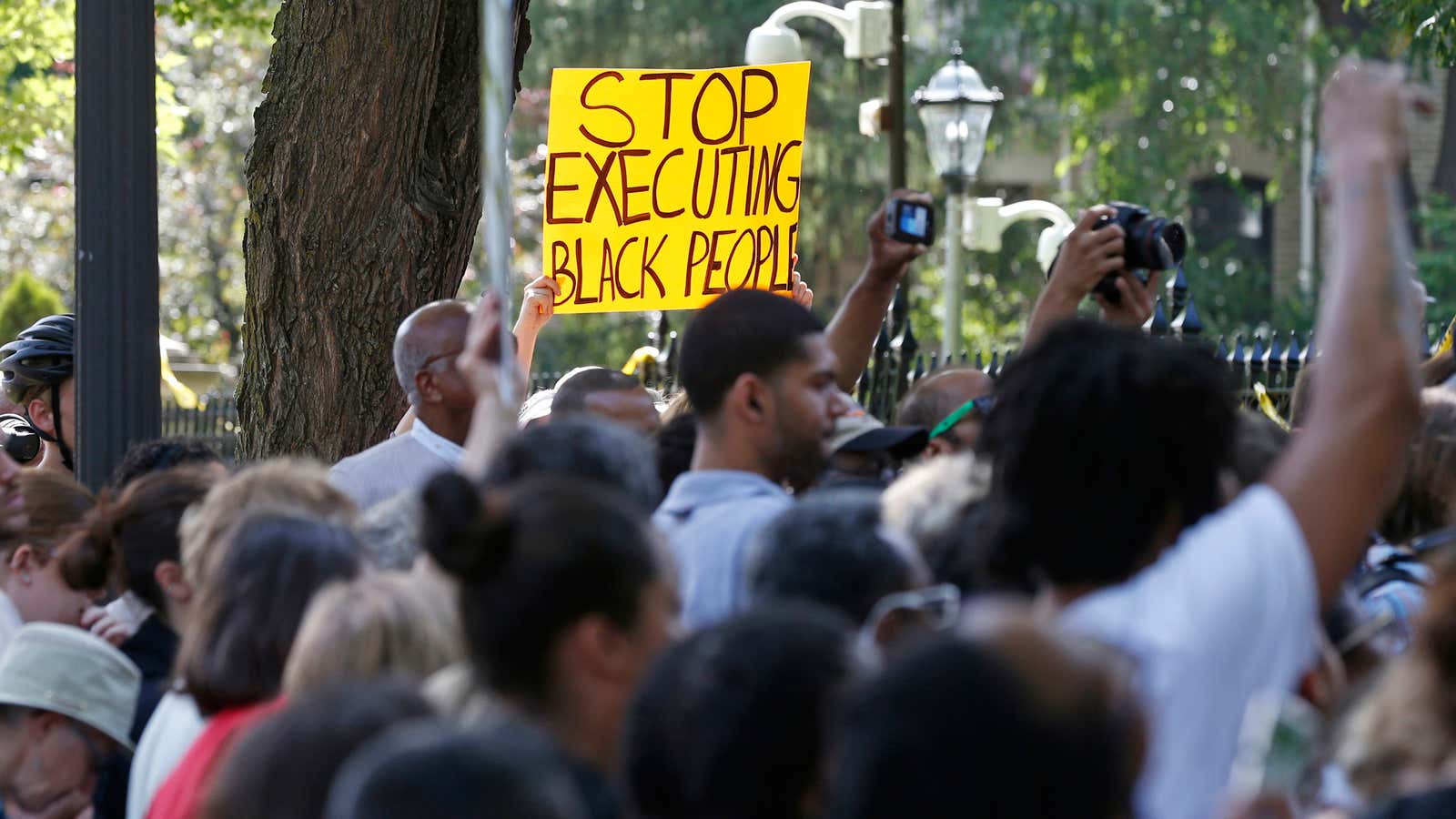The NRA likes to say that the best defense against a bad guy with a gun is a good guy with a gun. That argument fell apart completely this week. A good guy–at the very least, a man who should be presumed innocent–with a gun in his car was shot to death by a police officer. The shooter had been given a gun and badge by society because he was supposed to be good, too.
Philando Castile, in Minnesota, was shot dead for a broken taillight, and for following protocol in announcing to the officer who stopped him that he had a weapon in the car. Shot for reaching for his license. Alton Sterling, in Louisiana, was shot dead for selling CDs.
On July 7, a bad guy with a powerful gun killed five good guys with badges in Dallas; five police officers among the dozens whose interaction of mutual respect with a peaceful Black Lives Matter march was shattered.
During the chaos in Dallas, an innocent man with a rifle slung around his shoulder, per Texas’s open carry laws, was inaccurately identified as a suspect. You can’t be a good guy with a gun if you’re black, apparently.
The events in the US this week remind us that the so-called arc of the moral universe is bending far more gradually towards justice than any of us would hope for.
It seems that incarceration at out-of-proportion rates must no longer be a sufficient manifestation of America’s vengeance on black men–now America must kill them too.
Of course, America has been killing black men for centuries now. And while our history books carry gruesome reminders of the barbarous practices by which Africans became an enslaved people in the American colonies and the US, they lack the temporality and the visuals of today’s videos and photos–recorded by the phones we all carry now, that allow us to document injustice wherever it strikes.
America can be more efficiently outraged and embarrassed in 2016 than ever before. That is good, but Americans have to reckon with the fact that the violence is not new; what is new is the efficiency of mass media and social media at distributing these stories. The violence is an old tale that America keeps trying to ignore, explain away, forgive itself for, and congratulate itself on evolving beyond. But we can ignore it no longer. There is no rational explanation for it. We haven’t earned forgiveness. Any sense of evolution looks today more like a blip, an aberration from our nation’s continuous spilling of black peoples’ blood.
Why? And what can be done? As a child of immigrants, I inherited this cultural history. As a white man, I am perversely fortunate enough to be born onto the easy side of it. But today, and for a while now, it has felt totally insufficient to stand on personal outrage while the society I participate in continues to perpetrate crimes against innocent people. There is no easy side to it anymore, nor should there be.
Computers are like a bicycle for the mind, Steve Jobs said. That is, computers are a tool that enable us to go far beyond our innate mental capabilities. Well, firearms are like a bicycle for death. They are tools our society has accepted that allow for violence far beyond what we could achieve with lesser weapons. They are tools that allow racism to be expressed through murder. Anthropologists study societies by their tools, and these two are among the most prominent ones that our society will leave behind: one for advancement, one for violence. Our two natures, pulling against each other, as we pull ourselves apart.
The shame of America’s slaver past is one I feel even as an adopted son. Our dead predecessors have conscripted us into their battles. Just the way some historians argue that Rome never truly fell, that only the shape of it shifted into something unrecognizable, so too has America’s Civil War never truly ended. The stakes—the freedom and survival of our country—have never been resolved.
That’s why the case for reparations can be so thoroughly ignored by the bulk of society. Reparations can only be paid when victory is won. And the truth is the perpetrators of this awful assault on the freedom of all people have never surrendered.
Those of us on the side of equality and peace for all have one advantage over those who stand for hate and violence, and that is the rule of law. If computers and guns are bicycles, the law is the road. Laying it down is what enables societies to traverse intellectual and sociological terrain.
Right now our roads are leading to ruin. We have written our laws to enable violence and internal warfare, and to weaponize these baser instincts. We have written our laws to enable retribution rather than reconciliation. Our laws push America not to overcome its past, but to perpetuate its violent legacy, one traffic stop at at time. Until laws are passed that prohibit American weapons from being tools for mass assault, how can our internal war ever truly end? The tools we have and the roads we build shape what we can make and what type of world we inhabit.
Over the long moral arc of the universe, this American history will never be erased. That’s what those who carry hate in the hearts, and act on it with their guns, don’t yet realize. All their killing won’t unspill the stain of our ugly shared past. Violence only delays the day of our reconciliation to it, and to each other. So, the question is, how long are we—you and me—willing to wait for that day to come? And are we, those of us who want this to end, finally willing to stand up and peacefully do what we must to make that day come sooner?
